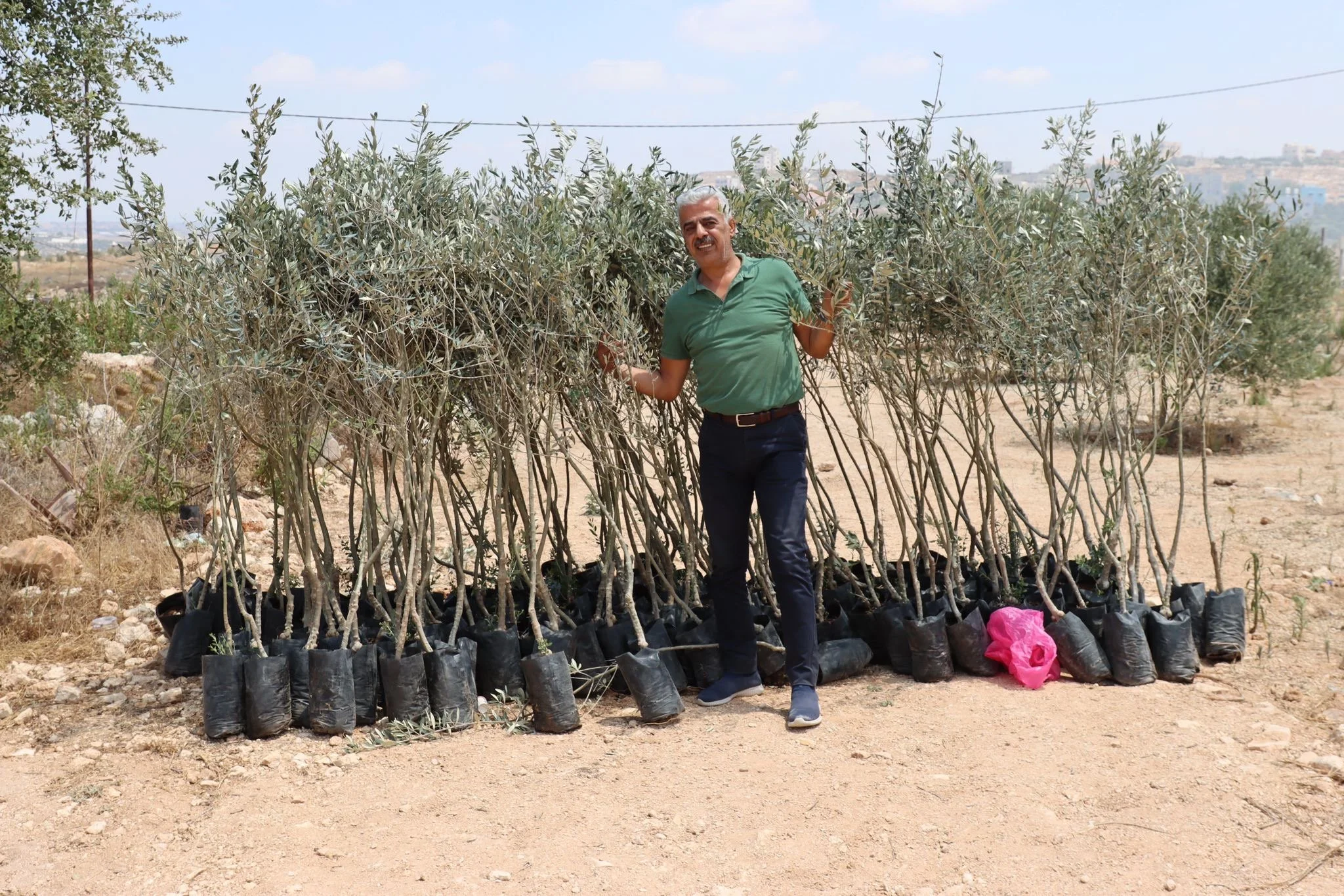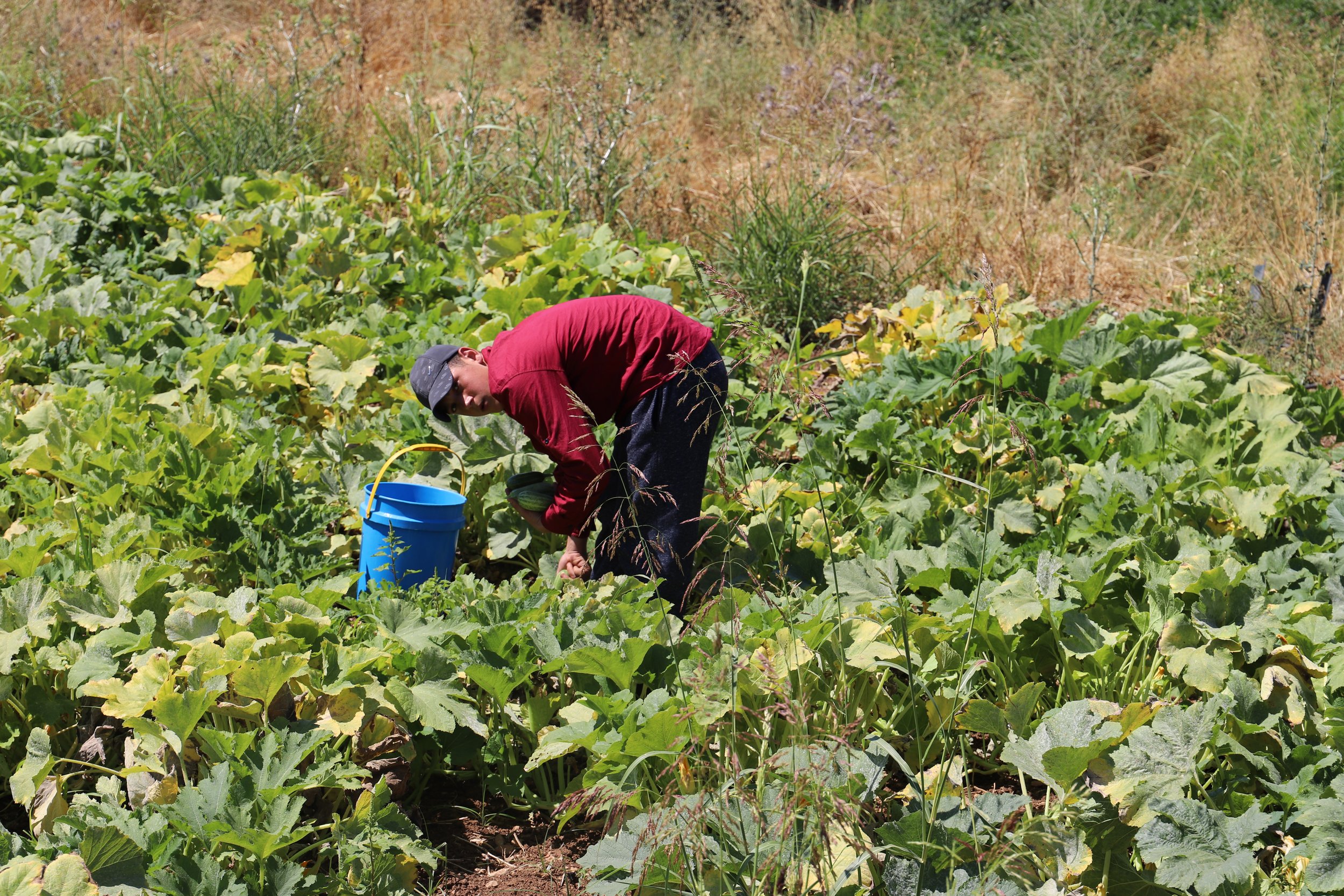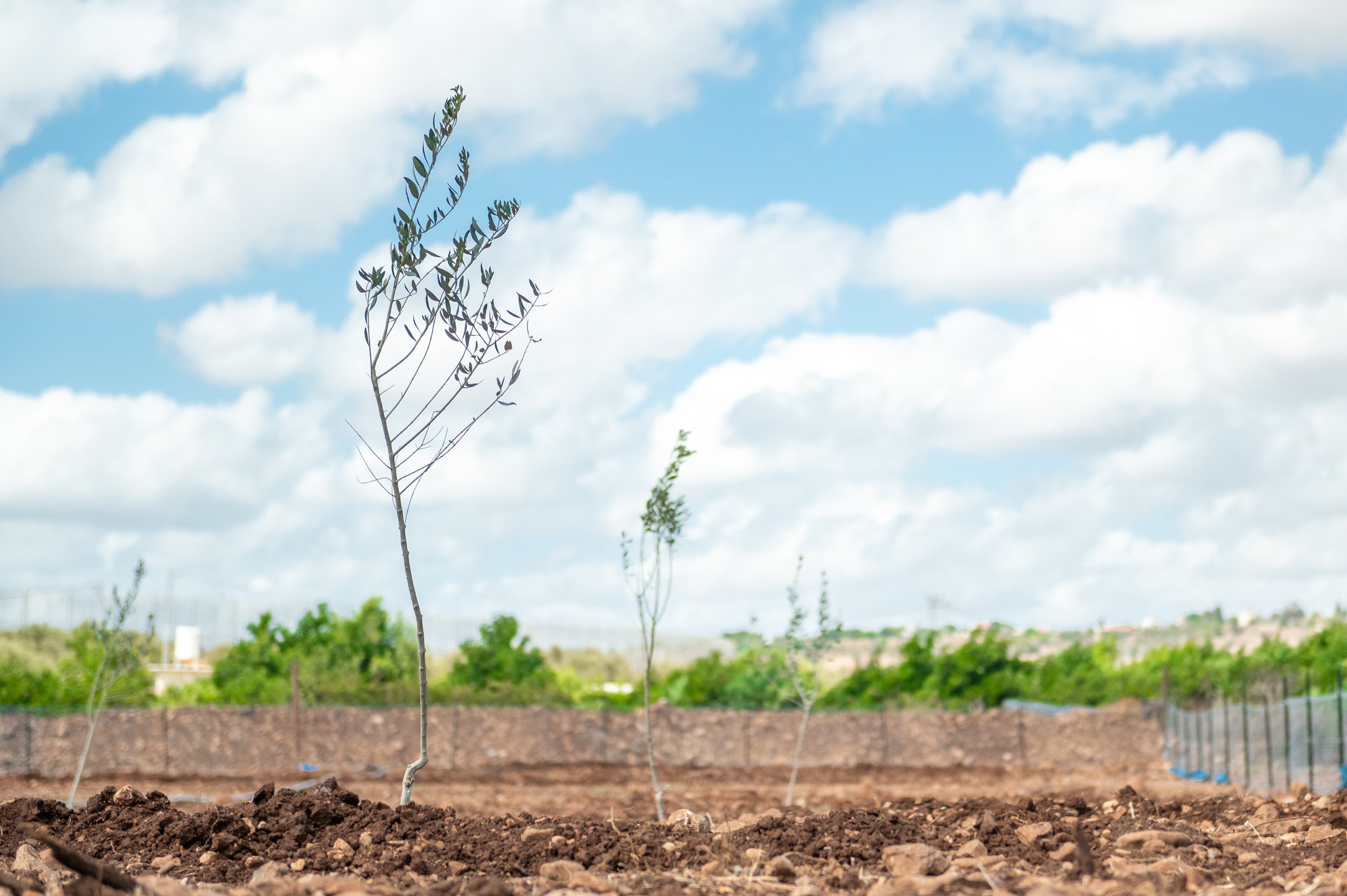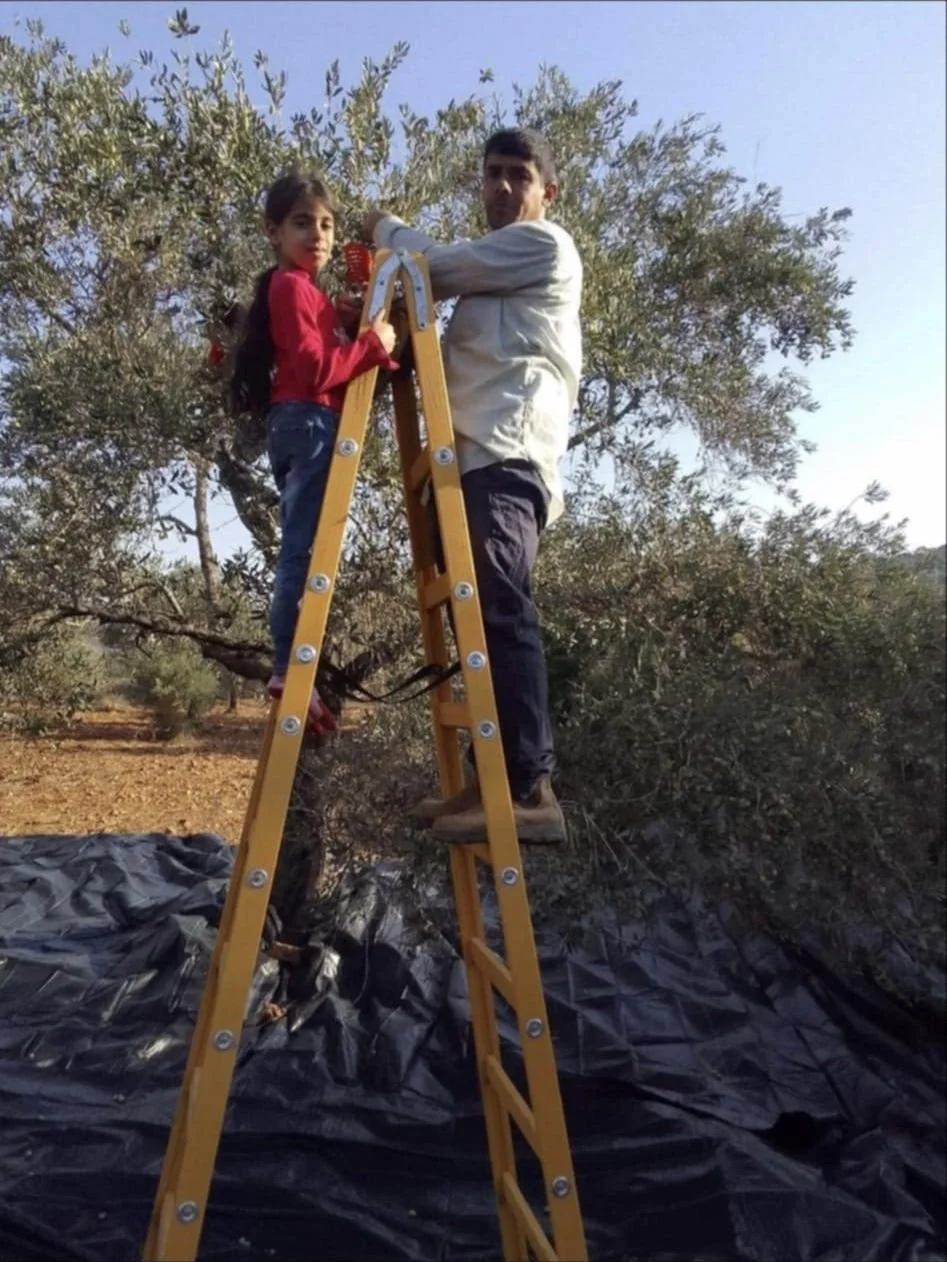Palestinian farmers face beatings, bullets, and militarized land theft just for growing food.
On ancestral land in the West Bank, Palestinian farmers risk arrest, assault, and death to reach their olive trees under Israeli occupation.
SHARE:
JUNE 19, 2025
BY NATHAN SING AND URBI KHAN
In the West Bank, Abbas Milhem hasn’t set foot on his farmland since October 2023. What was once a daily ritual—walking among his olive trees, nurturing their roots, and harvesting their fruit—has become a perilous act of resistance instead of a livelihood. Milhem says that he is not alone; for farmers here, each unpicked olive on their ancestral trees symbolizes lives deferred, survival contested, and history systematically erased.
“The first thing that olive trees symbolize for me is life and not just any life. It’s the happy life,” Milhem reflects. “If you are angry, go and sit under the shadow of an olive tree. Believe me, you will relax.” But the peace he once found among the branches is now unreachable.
At 58, farming is all Milhem has ever known. It’s the inheritance of generations—his father, grandfather, and great-grandfather before him cultivated almonds and olives on the land. “I learned how to bloom from him,” he says of his father, describing the wisdom passed down like family heirlooms: what to plant, when to harvest, and how to care for the trees that sustain them. Farming didn’t just put food on their table, he says, it offered a “dignified life” for his entire family. But today, dignity is a daily battle.
Abbas Milhem standing among olive saplings [L] and planting them [CENTRE] in the West Bank. Milhem pictured standing among olive groves.[R] [Photo courtesy of Palestinian Farmers' Union (PFU)]
Milhem owns eight plots of farmland—five passed down through his family and three purchased independently. For generations, Palestinian families have cultivated their harvests through traditional systems of communal care, says Milhem. Workers often receive a portion of the crop in exchange for their labour—a practice that binds communities through shared purpose. On his farmlands, Milhem continues this custom, giving a third of the olives harvested to local families who work the groves.
But maintaining this legacy has become a battle against escalating violence. In recent years, his olive trees have been burned, his crops stolen, and his workers brutally attacked.
Milhem recounted that in mid-September 2024, while a local family harvested table olives on his land—fruit destined for food rather than oil—a group of six Israeli settlers descended on them. The settlers tied up the workers, stole the olives, and seized equipment, Milhem said, including three olive harvesting machines, a generator, and other tools. The family was detained for hours. Three were eventually released, but the others were held for two days. Before leaving, the settlers issued a stark warning: return to this land, and you may not survive.
“The message those settlers conveyed to this family [is]—don’t come back again. Otherwise, we shoot you, we kill you,” recounted Milhem, who is also the executive director of the Palestinian Farmers’ Union (PFU).
Palestinian farmer picking and gathering cucumbers in the West Bank. [Photo courtesy of Union of Agricultural Work Committees (UAWC).]
Founded in 1993, the Palestinian Farmers’ Union represents small-scale farmers across the West Bank and Gaza. Headquartered in Ramallah, a city in the occupied West Bank, the organization provides training, organizes local associations, and advocates for land rights and food sovereignty under military occupation and ongoing settler expansion.
As executive director, Milhem has become a witness to the growing violence that now shadows his land. “I am witnessing [this violence] on my farms,” he told through food.
Milhem’s story is one of countless others. The 2024 olive harvest season unfolded under relentless violence and disruption in the West Bank. Ahead of the harvest season, UN experts had forewarned it would be the most dangerous season yet, as settler attacks surged and Israeli restrictions tightened. By the end of the season, those fears became reality.
A Palestinian elder's hand rests over a batch of olives, freshly harvested. [Photo courtesy of Union of Agricultural Work Committees (UAWC).]
A harvest season mired with escalating violence.
During October 2024, approximately 180 settler-related incidents were documented across nearly 90 Palestinian communities in the West Bank, with 60 per cent directly linked to the olive harvest.
The northern West Bank experienced the highest concentration of these attacks, accounting for one-third of the incidents, resulting in significant agricultural losses. Over 2,800 trees, predominantly olive trees, were burned, sawed off, or vandalized between October 1 and November 25, 2024.
The threat of violence is a challenge rooted in a decades-long conflict over land that dates back to Israel's establishment in 1948 and its occupation of significant areas of the West Bank following the 1967 Six-Day War. Once a thriving expanse of olive groves and grazing fields, the land has been carved up by bypass roads, fenced settlements, and military zones—measures Israeli authorities justify as necessary for security, citing the proximity of farmland to settlements and military installations. The Palestinian Authority and the United Nations, however, view these policies as illegal encroachments under international law, arguing they disproportionately harm Palestinian farmers by severing their access to land.
Over the past two years, access to farmland has been steadily eroded during Israel’s war in Gaza and the West Bank. Israeli settlers—who have been described as “extremists” by international government entities—have burned, uprooted, and stolen olive trees in Area C, while farmers like Milhem are increasingly barred from tending their land.
Map by through food with data from palestineportal.org
A majority of Area C is controlled by Israel and is known as the “bread basket” of the region. The controlled area encompasses 60 per cent of the West Bank territory. Israel’s war in Gaza has decimated the area’s agriculture and food system.
A representative for B’Tselem, an Israeli human rights organization, tells through food that the organization has been closely monitoring what it describes as an ongoing campaign by the Israeli government to make life unlivable for Palestinians across the occupied territories, which includes the dismantling of the food system in Gaza.
“The major goal is always to make Palestinians’ lives miserable in any way they can—or any way they can get away with—as long as the international community does practically nothing to stop them,” said Shai Parnes, a spokesperson for B’Tselem.
Throughout Israel’s war on Gaza, the organization has also documented a sharp increase in violence and repression in the West Bank, including widespread administrative detentions, hundreds of military checkpoints, and frequent road blockades. Israeli military operations in the northern West Bank—particularly in areas like Jenin—have destroyed infrastructure and displaced residents of refugee camps. Attacks on the food system, such as the systematic disruption of the annual olive harvest by both settlers and Israeli forces, are seen by B’Tselem as part of a broader policy to push Palestinians off their land. These “so-called legal procedures” by Israel, Parnes says, especially in Area C—where Israel retains full civil and military authority— “is to make [Palestinians] leave their lands, and to take as much Palestinian land as possible with as less Palestinian people as possible, and to expand the Israeli settlements”.
Palestinian farm worker setting up water irrigation system for a "Freedom Farm" plot in the West Bank. [Photo courtesy of Treedom for Palestine.]
Settler violence against Palestinians surged in 2023, with a 43 per cent increase in attacks compared to 2022, according to a U.S. Department of State 2023 Human Rights Report. The United Nations Office for the Coordination of Humanitarian Affairs (UNOCHA) accused the Israeli government of employing “lethal war-like tactics”. The U.S. Department of State Human Rights Report also detailed that the UNOCHA recorded 1,277 incidents, including 911 property attacks, 163 resulting in casualties, and 153 involving both, following October 7, 2023, marking the highest annual total since 2006. Weekly incidents of settler attacks on Palestinians rose from an average of 21 to 30.
During the 2023 olive harvest season, UNOCHA documented 113 incidents where Israeli settlers attacked Palestinians, damaged their trees, or stole crops and harvesting tools.
This destruction, combined with restricted access to farmlands due to blocked roads and revoked permits, left entire groves unharvested. In 2023, the UN reported that over 96,000 dunums (9,600 hectares) of olive-cultivated land went unharvested, resulting in a loss of 1,200 tonnes of olive oil, valued at $10 million USD. Meanwhile, administrative detention orders—policies allowing indefinite imprisonment without trial—no longer apply to Israeli settlers, further deepening the disparity in accountability.
In contrast, the Israeli government argues that the actions taken by its government are necessary for ensuring national security and preventing future attacks. From this perspective, the events which transpired on October 7th were an existential threat, justifying not only retaliation but also a strategic shift in how Israel controls the land. Supporters of the Israeli government argue that Hamas' continued presence in Gaza, and even the West Bank, poses an ongoing danger and that Israel’s military operations are about neutralizing threats, not indiscriminate expansion.
Before October 7, 2023, these acts of destruction in the West Bank and Gaza were interspersed with fleeting windows of coordinated harvests, as Palestinian authorities and the Israeli military arranged specific days for farmers to reach their groves. Even then, the arrangement was precarious. Now, that fragile access has collapsed entirely.
Starting in 2006, Israel’s Civil Administration shut down the permits system that once granted Palestinian farmers access to their land near settlements, making it nearly impossible for many to harvest their crops. Palestinian farmers continue to face constant hurdles; permits are denied, and they are restricted to smaller areas or permits are revoked without warning. After October 2023, even land that was once freely accessible will require special approval, adding another layer of control. With these restrictions and increasing settler violence, Palestinian communities are facing even greater displacement, cutting them off from a key source of livelihood, according to the UN.
The Palestinian Farmers’ Union told The Guardian in 2023 that olives are a life source for 110,000 Palestinian farmers and another 50,000 workers in the supply chain. For Milhem, these ancient trees represent not only sustenance but also a cultural heritage passed down through generations. Between a quarter and a third of the Palestinian population in the West Bank is estimated to work with olive trees or their produce, such as oil and soap. They serve as an unbroken connection to the land and, therefore, are symbols of resilience. But that connection is continuously under siege.
Abbas Milhem working with fellow farmers to harvest olives. [Photo courtesy of Palestinian Farmers' Union (PFU).]
At the same time, Palestinian olive oil is marketed globally as an artisanal product on Instagram, where brands like Shahed Olive Oil emphasize its organic, authentic origins. They link their products to generations of heritage, using evocative imagery, such as the late Heba Zagout’s artwork of women harvesting olives, to tell a story of tradition and perseverance. Yet, the oil’s scarcity is not the result of exclusivity but systemic violence—land confiscation, blockades, and settler aggression. While these campaigns support farmers, they also risk commodifying their struggle, packaging it for global consumption while overlooking the structural forces driving dispossession.
Recently, the Israeli government approved the construction of around 3,400 new housing units in the West Bank, solidifying the occupation’s grip on the region. From October 2023 to October 2024, there were 1,423 documented incidents of Israeli settler violence in the West Bank, averaging four incidents daily.
What happens when a homeland is engineered to disappear?
On a journey to her grandmother’s home in a West Bank village, what should have been a two-hour trip for Yasmeen El-Hasan turned into a seven-hour ordeal. “I haven’t been able to go visit my family for maybe two months now,” she told through food during 2024’s olive harvest season. “The roads are so dangerous.”
El-Hasan encounters new signs of encroachment whenever she travels to her family’s village. “Every time I go, I see on the way new Israeli settler outposts or expansion of new Israeli settler construction, new roads that they build over Palestinian communities,” she explains. “The power dynamics of how they are manufacturing spatial relations is also very intentional in terms of controlling vertical geographies.”
These “vertical geographies,” as El-Hasan describes them, are about more than controlling movement—they are about dismantling communities. “They’re basically trying to push us further and further and further into small bubbles that they can then pop,” she says.
Settlements rise above Palestinian villages, while checkpoints and roads isolate rural communities into fragmented “islands,” disconnected from one another and accessible only by Israeli-controlled routes.
A newly planted olive sapling overlooks a West Bank valley [L]; saplings grow within a fenced plot [CENTRE]; Palestinian farmers prepare land for planting [R]. Part of the “Freedom Farms” project co-led by the Palestinian Farmers' Union, these sites are chosen to avoid settlements and high-risk areas. [Photo courtesy of Treedom for Palestine.]
“The number of checkpoints between cities have increased which [has] led to significant delays. It now takes us hours to reach work or return home [in Ramallah],” Yasmine Nazzal, the procurement and logistics personnel to the Palestinian Farmers’ Union, told through food.
“The Israeli state facilitates the expansion of settlements and outposts,” El-Hasan explains, “while severely restricting Palestinian access to their own land through roadblocks, checkpoints, and fragmented infrastructure.” These restrictions don’t just disrupt daily life; they aim to force Palestinians into overcrowded urban centers and sever their connection to the countryside.
El-Hasan, an international advocacy coordinator with the Union of Agricultural Work Committees (UAWC), feels the impact firsthand. For decades, UAWC has been a lifeline for Palestinian farmers, helping them reclaim land, build water infrastructure, and sustain their agricultural livelihoods under immense pressure. Despite its vital role, the Israeli government designated UAWC as a terrorist organization in 2021—a move widely criticized by human rights groups as an attempt to stifle Palestinian civil society organizations and grassroots resilience.
The Israeli government justified this designation by alleging ties between UAWC and the Popular Front for the Liberation of Palestine (PFLP). However, international organizations, including Amnesty International and Human Rights Watch, condemned the decision as “appalling and unjust”. In 2022, nine EU countries, including France, Germany, and Ireland, publicly stated they would continue their partnerships with UAWC, citing a lack of credible evidence to support Israel's claims.
“Our work is not [that of] a service provider. Our purpose is to support the steadfastness of our people, and support the stewards of the land,” says El-Hasan. “In the West Bank, whenever I ask communities who are facing significant settler violence, pressure, or intimidation of forced displacement and IDF violence, ‘What is your immediate need?’ they say, ‘Just support our steadfastness. We just want to remain on our land. Support us in doing that,’” she explains. “UAWC helps sustain this presence by maintaining one main indigenous seed bank and providing farmers with essential tools. In Gaza, this support has included community kitchens, ensuring that even in the face of extreme hardship, people can remain rooted in their land and traditions. It shows how critical the physical presence on our land continues to be,” El-Hasan says.
When a farmer dies defending his land, how do his roots live on?
The legal foundation Palestinian farms rely on is as precarious as the olive trees themselves. Without regular access to their fields, farmers risk losing their land to seizure under Israeli laws targeting uncultivated plots. This deliberate strategy unravels generations of self-determination, turning farmland into contested territory. Each checkpoint, raid, and act of violence chips away at the lifeline these groves represent.
For Bilal Saleh, this fragility wasn’t abstract. The olive harvest wasn’t just a livelihood—it was his family’s legacy. Known in local markets as "the thyme seller" for the herbs and oils he cultivated alongside olives, Saleh’s connection to his small hillside grove in As-Sawi defined his life. But the olive trees that symbolized permanence were overshadowed by the nearby Israeli settlement of Rehelim, which crept closer year after year, claiming more of the valley.
Bilal Saleh pictured with one of his daughters Mais Saleh, shrouded by his crops in his field in As-Sawi, West Bank [L]. Saleh harvesting olives with his daughter in As-Sawi [R]. [Photo courtesy of Palestinian Farmers' Union (PFU)]
On October 28, 2023, Saleh and his family set out to harvest their olives, as they had every year. The tension in the air was constant, as much a part of the landscape as the trees themselves, but abandoning the harvest was never an option. What Saleh and his family didn’t know was that this would be Bilal’s final harvest.
As the family worked, they noticed settlers moving toward them from across the valley, prompting them to pack their equipment and head back to As-Sawi. Then Saleh realized he’d left his phone behind. He turned back alone to retrieve it.
Moments later, gunfire rang out. Saleh’s wife, Iklas, and his relatives ran toward the sound, finding him collapsed among the roots of his olive trees, bloodied by two gunshots to the chest and arm. His family used a ladder from the harvest to create a makeshift stretcher, carrying him up the hill toward the road. Surrounded by loved ones, Saleh took his final breaths, his four children bearing witness.
Following October 7, 2023, Israel’s National Security Minister, Itamar Ben-Gvir, distributed over 120,000 firearms to settlers. By October 2024, Israeli forces demolished or seized 1,768 Palestinian structures, displacing around 4,555 people, mainly in Tulkarem, Jerusalem, and Jenin, all three of which serve as agricultural hubs.
“It is catastrophic and disastrous, and we have big concerns,” Milhem told through food, referring to the Israeli government’s arming of settlers.
“All of harvesting is a communal activity. It is a family activity. Kids go down, we all go down together,” El-Hasan tells us, as she worked with her colleagues throughout the 2024 harvest.
“My colleague was just saying the other day that he doesn't take his kids with him to harvest olives, because their land is right next to a settlement. And if he's alone, that means he can run fast and leave if they attack,” El-Hasan told through food.
El-Hasan says that the attack on Palestinian farmlands is very coordinated. “When they uproot our trees, another thing they do is they cut the roots. They're very strategic in how they do this because they don't want us to replant them. And they'll burn them and the land, which not only destroys the trees and the nature but also harms the soil and the fertility of the land, making it difficult to continue to sustain ourselves and beyond.”
El-Hasan says that this is also a climate and economic disaster for this part of the world and for Palestinians.
Yasmeen El-Hasan harvesting olives in her family's village in the West Bank, before Israel's war on Gaza and subsequent military action and widespread Israeli settler violence. [Photo courtesy of Yasmeen El-Hasan.]
“People's abilities, or lack thereof, to harvest their olives properly, to reach their land, to care for their land, impacts them economically, socially, communally,” says El-Hasan. “That's something that is intentional by the occupation.”
Palestinian farmers work where no land is safe.
For civilians on the ground like Abbas Milhem, the barriers in the West Bank are both physical and existential. “Every uprooted tree, every poisoned field severs a piece of our history,” Milhem reflects. “But every harvest reminds us that resilience is our strongest form of resistance.”
Despite these challenges, Palestinian food sovereignty movements are finding ways to resist. Symbolic imagery, such as the watermelon—its colours reflecting the Palestinian flag—has become a subtle yet powerful tool for raising awareness across censored platforms.
The weight of these efforts reverberated across the world when journalist Bisan Odeh won an Emmy in 2024 for her work with Al Jazeera. Moments captured in Gaza, such as children cooking traditional dishes despite scarce resources, illustrate how food serves as a lasting link to heritage, connecting new generations to their roots.
To farm in the West Bank for Milhem is to insist on a future. For him, it is the most ordinary form of defiance: to keep trying planting and pruning even when his land is too dangerous to access.
“As Palestinians, we own the land,” he says. “Yes, settlers can confiscate my land. Yes, they can destroy it. Yes, they can kill me and my children. But they cannot kill the belief in my heart that this land is mine,” said Milhem.
“Generation after generation, people will inherit this belief, and no occupation can last forever.”
SHARE:
ABOUT NATHAN SING AND URBI KHAN
Nathan Sing is a journalist, filmmaker, and the founder of through food.
Urbi Khan is an editorial research producer and investigative journalist at through food.
MORE FROM THROUGH FOOD
Palestinian Farmers Must Farm to Keep Their Land—But They're Barred From It







![Milhem pictured standing among olive groves. [Photo courtesy of Palestinian Farmers' Union (PFU)]](https://images.squarespace-cdn.com/content/v1/66c3b2ddead2345caf29a8e4/eaac36b4-30f0-4d73-b8b7-f49f1c400753/Milhem+pictured+standing+among+olive+groves.)



















